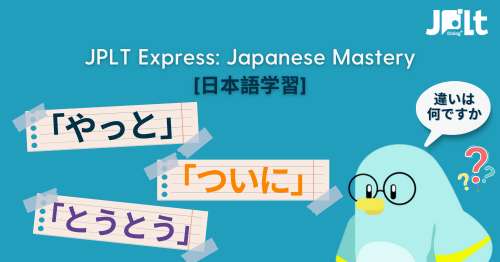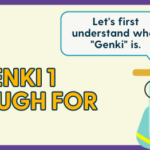[Japanese Language Learning]
The Difference Between “やっと,” “ついに,” and “とうとう”
“Isn’t ‘yatto,’ ‘tsuini,’ and ‘tōtō’ all the same?””What’s the difference between ‘yatto’ and ‘tsuini’? Don’t both express happiness?””Is ‘tōtō’ often used in a negative context?”
In Japanese, there are many words with similar meanings that have subtle differences in nuance. “やっと” (yatto), “ついに” (tsuini), and “とうとう” (tōtō) are prime examples. These words can be particularly confusing in the early stages of learning Japanese.
In this article, Eri-san from JPLT Online Japanese Language School will clearly explain the differences between these words. Let’s master the usage of each word through examples!
■ What’s the Difference Between “やっと,” “ついに,” and “とうとう”?
“やっと” (yatto), “ついに” (tsuini), and “とうとう” (tōtō) all describe a situation where something has finally happened, but each word emphasizes a different aspect:
- やっと (yatto): Expresses joy or relief when something long-awaited finally happens after much effort. It strongly conveys a sense of achievement after struggle, making it a very positive word.
- Example: やっと試験が終わった!(I finally finished the exam!)
- ついに (tsuini): Expresses excitement or emotion when something long-anticipated finally becomes a reality. It conveys the thrill of something you’ve been waiting for happening.
- Example: ついに念願の旅行に行ける!(I can finally go on the long-awaited trip!)
- とうとう (tōtō): Often expresses resignation or inevitability when something unavoidable finally happens. It also includes the nuance of something reaching an extreme state.
- Example: とうとう雨が降ってしまった。(It finally started to rain.)
■ Let’s Compare with Example Sentences!
Word | Example Sentence | Nuance |
|---|---|---|
やっと | やっと、プロジェクトの締め切りに間に合った。長かった道のりだったが、努力が報われた。 | A sense of achievement and relief after a long struggle. |
やっと、試験勉強が終わって、好きなことができる。 | Joy from being able to do something after a long wait. | |
やっと、雨が上がったので、洗濯物が干せる。 | Joy from a long-awaited situation finally occurring. | |
ついに | ついに、念願の海外旅行に行ける。 | Excitement from a long-awaited dream coming true. |
ついに、新しいスマートフォンを手に入れた。 | Joy from finally obtaining something you’ve been looking forward to. | |
ついに、あのレストランに予約が取れた。 | Thrill from finally being able to go to a popular place. | |
とうとう | とうとう、我慢の限界が来て、怒鳴ってしまった。 | Emotion when reaching the limit of patience, unable to hold back anymore. |
とうとう、雨が降り出し、運動会は中止になった。 | Disappointment when a long-awaited event is canceled. | |
とうとう、電池が切れてしまった。 | Frustration or annoyance when something fails at a critical moment. |
■ Delving Deeper into the Nuances of Each Word
- やっと (yatto): Expresses joy or relief when a goal is finally achieved after a long time and effort. It includes a sense of liberation that comes from the accomplishment.
- ついに (tsuini): Expresses excitement or emotion when something long-anticipated is finally realized. It conveys a sense of elation as your expectations become reality.
- とうとう (tōtō): Often used to express resignation or inevitability when something unavoidable finally happens. It can also be used neutrally, depending on the situation.
■ Summary
The Difference Between “やっと,” “ついに,” and “とうとう”
While “やっと” (yatto), “ついに” (tsuini), and “とうとう” (tōtō) all describe situations where something has finally happened, each word emphasizes different aspects. “やっと” highlights the sense of achievement after a struggle, “ついに” focuses on the arrival of something long-awaited, and “とうとう” often refers to inevitable events or reaching an extreme state.
Using these words appropriately will enrich your Japanese expressions.
For those who want to make Japanese learning more enjoyable and efficient, JPLT Online Japanese School is highly recommended. At JPLT, learners from around the world can take one-on-one lessons or group lessons with native teachers. Whether you’re preparing for the Japanese Language Proficiency Test (JLPT) or practicing daily conversation, JPLT offers various courses tailored to your level and goals.
At JPLT Online Japanese School, we support learners at all levels—from those who are just “やっと” (finally) starting to study Japanese, to those who “ついに” (finally) want to master it. The day may come when you “とうとう” (finally) become fluent in Japanese!
Now, why not start learning Japanese with JPLT?




